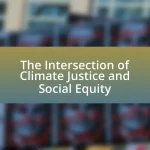The article analyzes the intersection of environmentalism and leftist politics, highlighting their shared commitment to social justice, economic equity, and sustainable practices. It discusses how leftist movements advocate for policies that address environmental degradation while promoting the rights of marginalized communities, exemplified by initiatives like the Green New Deal. Key historical events, ideological influences, and the role of grassroots movements are examined to illustrate how environmentalism has become intertwined with leftist political strategies. The article also addresses the challenges faced at this intersection and emphasizes the significance of integrating social equity into environmental policies to foster a sustainable future.

What is the Intersection of Environmentalism and Leftist Politics?
The intersection of environmentalism and leftist politics is characterized by a shared commitment to social justice, economic equity, and sustainable practices. Leftist political movements often advocate for policies that address environmental degradation while simultaneously promoting the rights of marginalized communities. For instance, the Green New Deal, proposed in the United States, aims to tackle climate change through comprehensive reforms that include job creation and economic restructuring, reflecting the leftist emphasis on equity. Studies show that environmental issues disproportionately affect low-income and minority populations, reinforcing the leftist perspective that environmentalism must integrate social justice to be effective.
How do environmentalism and leftist politics relate to each other?
Environmentalism and leftist politics are closely related as both advocate for social justice, equity, and the protection of the environment. Leftist political ideologies often emphasize the need for systemic change to address environmental issues, linking ecological sustainability with economic and social reforms. For instance, the Green New Deal, proposed in the United States, illustrates this connection by promoting renewable energy and job creation while addressing income inequality. Research shows that leftist movements frequently prioritize environmental policies as integral to their broader goals of social equity and justice, highlighting the interdependence of ecological health and societal well-being.
What historical events shaped the relationship between environmentalism and leftist politics?
The relationship between environmentalism and leftist politics has been shaped by several key historical events, including the rise of the modern environmental movement in the 1960s and 1970s, the publication of Rachel Carson’s “Silent Spring” in 1962, and the establishment of Earth Day in 1970. These events catalyzed public awareness of environmental issues and aligned them with leftist ideologies that advocate for social justice and equity. The 1972 United Nations Conference on the Human Environment in Stockholm further solidified this connection by emphasizing the need for global cooperation on environmental issues, which resonated with leftist calls for collective action against corporate exploitation and environmental degradation. Additionally, the emergence of eco-socialism in the late 20th century explicitly linked environmental sustainability with socialist principles, arguing that capitalism’s inherent inequalities contribute to ecological crises. These historical milestones illustrate how environmentalism has increasingly intertwined with leftist politics, advocating for systemic change to address both ecological and social injustices.
How do leftist ideologies influence environmental policies?
Leftist ideologies significantly influence environmental policies by prioritizing social equity and sustainability. These ideologies advocate for government intervention in the economy to address environmental issues, emphasizing the need for regulations that protect natural resources and promote renewable energy. For instance, many leftist political platforms support the Green New Deal, which aims to create jobs in renewable energy sectors while addressing climate change. This approach is backed by research indicating that transitioning to a green economy can reduce carbon emissions and promote social justice. Additionally, leftist movements often highlight the disproportionate impact of environmental degradation on marginalized communities, advocating for policies that ensure equitable access to clean air and water.
Why is the intersection of environmentalism and leftist politics significant?
The intersection of environmentalism and leftist politics is significant because it promotes social justice alongside ecological sustainability. Leftist political ideologies often emphasize the need for equitable resource distribution and advocate for marginalized communities disproportionately affected by environmental degradation. For instance, the Green New Deal in the United States aims to address climate change while creating economic opportunities for low-income populations, illustrating how leftist policies can integrate environmental goals with social equity. This synergy is crucial as it fosters a holistic approach to tackling both environmental crises and social inequalities, thereby enhancing the effectiveness of policy initiatives aimed at creating a sustainable future.
What are the key challenges faced at this intersection?
The key challenges faced at the intersection of environmentalism and leftist politics include ideological fragmentation, economic feasibility, and public perception. Ideological fragmentation arises from differing priorities within leftist movements, where some factions may prioritize social justice over environmental issues, leading to conflicts in policy focus. Economic feasibility is a challenge as ambitious environmental policies often require significant financial investment, which can be contentious among leftist groups advocating for wealth redistribution. Public perception also poses a challenge, as some voters may view environmental initiatives as elitist or disconnected from immediate social concerns, complicating the coalition-building necessary for effective policy implementation.
How does this intersection impact social justice movements?
The intersection of environmentalism and leftist politics significantly enhances social justice movements by promoting equity and inclusivity in addressing environmental issues. This synergy fosters a holistic approach that recognizes the disproportionate impact of environmental degradation on marginalized communities, thereby advocating for policies that prioritize social equity alongside environmental sustainability. For instance, the Green New Deal, a proposal in the United States, aims to tackle climate change while simultaneously addressing economic inequality, illustrating how leftist political frameworks can drive comprehensive social justice initiatives. This intersection not only amplifies the voices of those most affected by environmental injustices but also mobilizes grassroots movements that demand systemic change, thereby reinforcing the interconnectedness of social and environmental justice.

What are the Core Principles of Environmentalism and Leftist Politics?
The core principles of environmentalism and leftist politics include sustainability, social justice, and collective action. Sustainability emphasizes the need to protect natural resources and ecosystems for future generations, advocating for policies that reduce pollution and promote renewable energy. Social justice focuses on addressing inequalities, ensuring that marginalized communities have equal access to environmental benefits and are not disproportionately affected by environmental harm. Collective action highlights the importance of grassroots movements and community engagement in driving change, reflecting the belief that systemic issues require collaborative solutions. These principles are supported by various studies, such as the 2018 report from the Intergovernmental Panel on Climate Change, which underscores the urgent need for equitable climate action to mitigate environmental degradation while promoting social equity.
What are the foundational beliefs of environmentalism?
The foundational beliefs of environmentalism center around the intrinsic value of nature, the interconnectedness of all living beings, and the necessity for sustainable practices to protect the planet. Environmentalism asserts that human activities significantly impact ecosystems, leading to degradation and loss of biodiversity. This belief is supported by scientific evidence indicating that climate change, pollution, and habitat destruction threaten both natural environments and human health. Furthermore, environmentalists advocate for social justice, recognizing that marginalized communities often bear the brunt of environmental harm, thus linking ecological issues with social equity.
How do these beliefs advocate for sustainability?
These beliefs advocate for sustainability by promoting the idea that environmental protection is a collective responsibility, emphasizing social equity and justice as essential components of ecological health. Leftist political ideologies often argue that sustainable practices must address systemic inequalities, ensuring that marginalized communities have access to resources and decision-making processes. For instance, the Green New Deal in the United States aims to create jobs in renewable energy sectors while addressing climate change, illustrating how economic and environmental goals can align. This approach is supported by research indicating that inclusive policies lead to more effective environmental outcomes, as seen in studies by the United Nations Environment Programme, which highlight the importance of social equity in achieving sustainable development goals.
What role does biodiversity play in environmentalism?
Biodiversity plays a crucial role in environmentalism by maintaining ecosystem stability and resilience. Diverse ecosystems provide essential services such as pollination, nutrient cycling, and climate regulation, which are vital for human survival and environmental health. For instance, a study published in the journal “Nature” found that ecosystems with higher species diversity are more productive and better able to withstand environmental stressors, such as climate change and habitat destruction. This evidence underscores the importance of preserving biodiversity as a fundamental aspect of environmental protection and sustainability efforts.
What are the key tenets of leftist politics?
The key tenets of leftist politics include social equality, economic justice, and collective ownership of resources. Social equality emphasizes the reduction of disparities in wealth and power, advocating for policies that promote civil rights and social welfare. Economic justice focuses on addressing income inequality through progressive taxation, labor rights, and universal access to essential services. Collective ownership advocates for public or cooperative control of resources, aiming to prioritize community needs over individual profit. These principles are often supported by historical movements, such as the labor movement and civil rights activism, which have sought to challenge systemic inequalities and promote a more equitable society.
How do leftist politics address economic inequality?
Leftist politics address economic inequality primarily through policies aimed at wealth redistribution and social welfare programs. These policies often include progressive taxation, where higher income earners pay a larger percentage of their income in taxes, and increased funding for public services such as healthcare, education, and housing. For instance, countries with strong leftist policies, like the Nordic nations, implement high tax rates on the wealthy to fund extensive social safety nets, resulting in lower levels of income inequality as measured by the Gini coefficient. Additionally, leftist movements advocate for labor rights, minimum wage increases, and universal basic income, all of which aim to elevate the economic status of lower-income individuals and reduce the wealth gap.
What is the leftist perspective on government intervention in environmental issues?
The leftist perspective on government intervention in environmental issues advocates for significant state involvement to address ecological crises and promote sustainability. Leftists argue that government action is essential to regulate industries, enforce environmental protections, and combat climate change, as market-driven solutions often fail to prioritize ecological health. Historical examples include the establishment of the Environmental Protection Agency in the United States in 1970, which was a response to growing environmental concerns and aimed to regulate pollution and protect natural resources. This perspective emphasizes that without government intervention, marginalized communities disproportionately suffer from environmental degradation, highlighting the need for policies that ensure equitable access to a healthy environment.

How do Environmental Movements Influence Leftist Political Strategies?
Environmental movements significantly influence leftist political strategies by prioritizing sustainability and social justice within their agendas. These movements advocate for policies that address climate change, promote renewable energy, and ensure equitable resource distribution, aligning with leftist values of equity and community welfare. For instance, the rise of the Green New Deal in the United States illustrates how environmental activism has reshaped leftist political discourse, pushing for comprehensive reforms that integrate environmental sustainability with economic and social justice. This shift is evidenced by increased voter support for candidates who champion environmental issues, as seen in various electoral outcomes where eco-conscious platforms gained traction among leftist parties.
What strategies do environmental movements employ to engage with leftist politics?
Environmental movements engage with leftist politics primarily through coalition-building, grassroots organizing, and advocating for social justice. Coalition-building allows these movements to align with leftist groups that share common goals, such as economic equality and anti-capitalism, thereby amplifying their collective voice. Grassroots organizing empowers local communities to participate in environmental advocacy, fostering a sense of ownership and urgency around issues like climate change and pollution, which are often linked to systemic inequalities. Additionally, advocating for social justice highlights the intersectionality of environmental issues, emphasizing that marginalized communities disproportionately bear the brunt of environmental degradation. This approach is supported by studies showing that environmental degradation often exacerbates social inequalities, thus reinforcing the need for a leftist political framework that prioritizes both ecological sustainability and social equity.
How do grassroots movements shape leftist political agendas?
Grassroots movements significantly shape leftist political agendas by mobilizing community engagement and advocating for social justice issues. These movements often emerge from local concerns, such as environmental degradation or economic inequality, and they influence policy by raising awareness and pushing for legislative changes. For instance, the Sunrise Movement has effectively brought climate change to the forefront of political discourse, advocating for the Green New Deal, which aims to address both environmental and economic issues. This grassroots activism has led to increased support for progressive policies among lawmakers, demonstrating how local initiatives can drive national political agendas.
What role do protests and activism play in this relationship?
Protests and activism serve as critical mechanisms for mobilizing public support and influencing policy within the intersection of environmentalism and leftist politics. These actions raise awareness about environmental issues, galvanize communities, and apply pressure on governments and corporations to adopt sustainable practices. For instance, the global climate strikes initiated by youth activists in 2019, inspired by Greta Thunberg, demonstrated the power of collective action in demanding urgent climate policies, leading to increased discussions in legislative bodies worldwide. Such activism not only highlights the urgency of environmental crises but also aligns with leftist ideologies that advocate for social justice, equity, and systemic change, reinforcing the interconnectedness of environmental and political movements.
How do leftist political parties incorporate environmental issues into their platforms?
Leftist political parties incorporate environmental issues into their platforms by prioritizing sustainability, advocating for climate justice, and promoting policies aimed at reducing carbon emissions. These parties often emphasize the need for a transition to renewable energy sources, such as wind and solar power, to combat climate change and reduce reliance on fossil fuels. For instance, the Green New Deal proposed by various leftist parties in the United States aims to create millions of jobs in renewable energy sectors while addressing social inequalities. Additionally, leftist parties frequently support international agreements like the Paris Accord, which seeks to limit global warming, demonstrating their commitment to global environmental cooperation. This integration of environmental issues reflects a broader ideological stance that views ecological health as interconnected with social and economic justice.
What policies have been proposed by leftist parties to address environmental concerns?
Leftist parties have proposed several policies to address environmental concerns, including the Green New Deal, which aims to transition to renewable energy, create green jobs, and reduce carbon emissions significantly. This policy framework emphasizes government investment in sustainable infrastructure and aims for net-zero greenhouse gas emissions by 2050. Additionally, leftist parties advocate for stricter regulations on pollution, the promotion of public transportation, and the implementation of a carbon tax to incentivize reductions in fossil fuel use. These proposals are supported by scientific consensus on climate change, highlighting the urgent need for systemic change to mitigate environmental degradation.
How do these policies reflect the values of environmentalism?
These policies reflect the values of environmentalism by prioritizing sustainability, conservation, and the protection of natural resources. For instance, regulations aimed at reducing carbon emissions align with the environmentalist principle of combating climate change, which is supported by scientific consensus indicating that human activities significantly contribute to global warming. Additionally, policies promoting renewable energy sources, such as wind and solar, demonstrate a commitment to reducing reliance on fossil fuels, thereby preserving ecosystems and reducing pollution. Furthermore, initiatives that protect biodiversity, such as establishing protected areas and enforcing anti-deforestation laws, are rooted in the environmentalist belief that all species have intrinsic value and that healthy ecosystems are essential for human well-being.
What are the Future Trends at the Intersection of Environmentalism and Leftist Politics?
Future trends at the intersection of environmentalism and leftist politics include a growing emphasis on climate justice, the promotion of green jobs, and the integration of social equity into environmental policies. Climate justice advocates argue that marginalized communities disproportionately suffer from environmental degradation, leading leftist movements to prioritize policies that address these inequalities. For instance, the Green New Deal in the United States aims to create millions of jobs in renewable energy sectors while ensuring that vulnerable populations benefit from these initiatives. Additionally, leftist political parties worldwide are increasingly adopting sustainable practices and advocating for systemic changes to combat climate change, as evidenced by the rise of eco-socialism, which combines ecological sustainability with social justice principles. These trends reflect a broader recognition that environmental issues are inherently linked to social and economic inequalities, driving leftist agendas toward more inclusive and sustainable solutions.
How is climate change reshaping leftist political discourse?
Climate change is reshaping leftist political discourse by prioritizing environmental justice and sustainability in policy discussions. This shift is evident as leftist parties increasingly advocate for comprehensive climate action, linking ecological issues with social equity, economic reform, and public health. For instance, the Green New Deal in the United States exemplifies this integration, proposing a framework that addresses climate change while promoting job creation and reducing inequality. Additionally, recent surveys indicate that a significant majority of left-leaning voters view climate change as a critical issue, influencing electoral strategies and party platforms. This evolving discourse reflects a broader recognition that climate change disproportionately affects marginalized communities, thus driving leftist movements to adopt more inclusive and intersectional approaches to environmental policy.
What emerging movements are influencing this intersection?
Emerging movements influencing the intersection of environmentalism and leftist politics include the Green New Deal, climate justice activism, and eco-socialism. The Green New Deal advocates for comprehensive policy changes to address climate change while promoting social equity, reflecting a leftist approach to environmental issues. Climate justice activism emphasizes the disproportionate impact of environmental degradation on marginalized communities, aligning with leftist values of social justice and equity. Eco-socialism combines ecological sustainability with socialist principles, arguing that capitalism’s inherent inequalities hinder effective environmental action. These movements collectively push for systemic change, highlighting the interconnectedness of environmental and social issues.
What Practical Steps Can Individuals Take to Support the Intersection of Environmentalism and Leftist Politics?
Individuals can support the intersection of environmentalism and leftist politics by actively participating in grassroots movements that advocate for sustainable policies and social justice. Engaging in local environmental organizations, such as those focused on climate justice, allows individuals to contribute to initiatives that prioritize both ecological health and equitable resource distribution. For instance, the Sunrise Movement has mobilized youth to demand a Green New Deal, which integrates environmental sustainability with economic equity. Additionally, individuals can support political candidates who prioritize environmental legislation and social equity, thereby influencing policy at higher levels. Research indicates that communities with strong environmental advocacy often see improved local policies that reflect both ecological and social priorities, demonstrating the effectiveness of collective action in this intersection.
How can individuals engage in local environmental initiatives?
Individuals can engage in local environmental initiatives by participating in community clean-up events, joining local environmental organizations, and advocating for sustainable practices within their neighborhoods. Community clean-up events, such as those organized by Keep America Beautiful, allow individuals to directly contribute to the improvement of local environments. Joining organizations like the Sierra Club or local conservation groups provides opportunities for education, activism, and collaboration on environmental projects. Advocacy for sustainable practices can involve attending town hall meetings to support policies that promote renewable energy, waste reduction, and conservation efforts, thereby influencing local governance and community standards.
What role can voting play in promoting environmental justice through leftist politics?
Voting plays a crucial role in promoting environmental justice through leftist politics by enabling citizens to elect representatives who prioritize equitable environmental policies. Leftist political platforms often advocate for systemic changes that address the disproportionate impact of environmental degradation on marginalized communities. For instance, studies show that policies supporting renewable energy, pollution regulation, and community-led environmental initiatives are more likely to be implemented when leftist candidates are elected. Furthermore, voter mobilization efforts in these communities can lead to increased political representation, ensuring that environmental concerns are addressed in legislative agendas. This connection between voting and environmental justice is evidenced by the success of initiatives like the Green New Deal, which aims to tackle climate change while promoting social equity.















